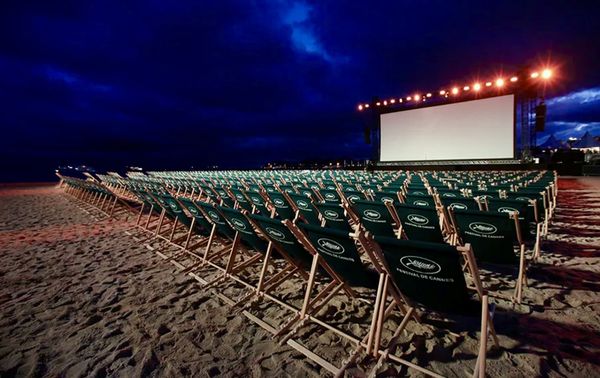 |
| The beach cinema in Cannes ready for the start of this year’s 74th edition Photo: Courtesy of Cannes Film Festival |
 |
| Jury president Spike Lee on the poster for this year's Cannes Photo: Courtesy of Cannes Film Festival |
Festival chief Thierry Frémaux’s gamble appears to have paid off with one of the strongest selections in years with a Competition to be scrutinised by the first black jury president Spike Lee and his cohorts. Festival regulars including Asghar Farhadi, Bruno Dumont, Sean Penn, Leos Carax (opening the festival with Annette starring Marion Cotillard and Adam Driver), Joachim Trier plus Palme d’Or winners Jacques Audiard, Nanni Moretti and Apichatpong Weerasethakul, are represented, and Wes Anderson’s The French Dispatch, selected to open Cannes last year, was kept back to allow it to premiere one year on. The new Cannes Premiere strand also features directors whose work has been highlighted previously among them Andrea Arnold, Arnaud Desplechin, Oliver Stone, Gaspar Noé, Italian veteran Marco Bellocchio (who is to received an honorary Palme d’Or this year) and South Korea’s Hong Sangsoo.
Frémaux who created the Cannes Label last year to enable some films selected for the 2020 edition to tour to other Festivals, obviously looked on with frustration as other Festivals such as Venice managed because of a blip in the rate of infections at the time to host physical editions although Toronto (also in September) largely was a digital affair. In the Czech Republic the Karlovy Vary International Film Festival moved from its usual June/July dates this year to August to keep some distance from Cannes but is aiming for a physical festival as are Venice and Deauville, set to run from 1 September.
 |
| Marion Cotillard in Leos Carax’s Annette Photo: Courtesy of Cannes Film Festival |
Frémaux sees the return of the Festival as statement of faith in the revival of cinema as audiences cautiously venture forth to the big screen. Many of the titles premiered in Cannes will find a place on global screens in the months after the Festival, some with glittering prizes after the closing ceremony on 17 July.
Lee’s jury comprises Mati Diop, director (France, Senegal); Mylène Farmer, singer, songwriter (Canada, France); Maggie Gyllenhaal, actress, producer, screenwriter, director (US), Jessica Hausner, director, producer, screenwriter (Austria); Mélanie Laurent, actress, director, screenwriter (France); Kleber Mendonça Filho, director, producer, screenwriter (Brazil), Tahar Rahim, actor (France); Song Kang-ho, actor (South Korea). Their deliberations are likely to be lively especially when it’s recalled that Lee missed out the Palme d’Or in 1989 when Steven Soderbergh’s Sex Lies and Videotape won out over Do the Right Thing. Lee, did of course, come up trumps with BlacKkKlansman in 2019 which garnered the Cannes Grand Prix (as well as an Oscar for his adapted screenplay).
 |
| Cannes Film Festival director Thierry Frémaux on Spike Lee: 'We could not have asked for a more powerful personality to chart our troubled times' Photo: Courtesy of Cannes Film Festival |
Although EU attendees are unlikely to encounter any difficulties about entering France restrictions from the UK and the US still suggest a period of quarantine on arrival, travel only for “compelling reasons” and quarantine on return home although these regulations are likely to be relaxed shortly and may not be rigorously applied. To help those affected, the festival has issued a laissez-passer document to help participants negotiate any difficulties at borders assuming they are double vaccinated and PCR tested.
The festival has had its share of disruptive controversies over the years. Some 53 years ago Cannes was called off halfway through. It started as planned on 10 May, 1968, with a restored version of Gone With The Wind. American actress and by then Princess of Monaco, Grace Kelly, hosted the opening ceremony. The trouble was that outside the Cannes bubble Paris, and most of France, was burning amid student protests and strikes which saw some three million French workers take to the streets, effectively shutting down the country.
If this this year’s edition marks a “return to normal” starting point for the film industry Frémaux and his team deserve their own Palme d’Or for a courageous and innovative undertaking.





















